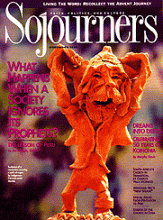The awarding of the Nobel Peace Prize last month to Guatemalan human rights activist Rigoberta Menchu promises to shine a spotlight on the violent repression by the army and military-supported "civilian patrols," whose "scorched earth" policy over the last three decades has left hundreds of thousands dead and millions displaced. Most of the victims of the violence have been Indians, who make up more than 60 percent of Guatemala's population.
Menchu's prize is "important as an acknowledgment of the incredible suffering of the indigenous people of Guatemala," Anne Manuel of Americas Watch told Sojourners. Both of Menchu's parents and her brother were killed by the Guatemalan military. "Her individual tragedy," Manuel said, "is so typical of what the people of Guatemala, especially the Quiche Indians, have suffered at the hands of the army - not 500 years ago, but in the last three decades."
Perhaps the most important result of the Nobel committee's decision was reflected in the celebrations held throughout Guatemala the day after Menchu's prize was announced. Thousands of Indians marched through Guatemala City, overshadowing the official ceremonies earlier in the week marking the 500th anniversary of Columbus' arrival in the Americas. The chair of the awards committee said it was "not a coincidence" that an Indian was chosen for the honor in the Columbus anniversary year, but that it was "not the only factor."
The joyful festivity by Indians and others gave hope to some that the blanket of fear by which the army has controlled the people might at long last be lifted. The celebrations gave indication that the awarding of the Nobel Peace Prize "has the possibility of being a watershed event in the history of Guatemala," Manuel said.
Read the Full Article

